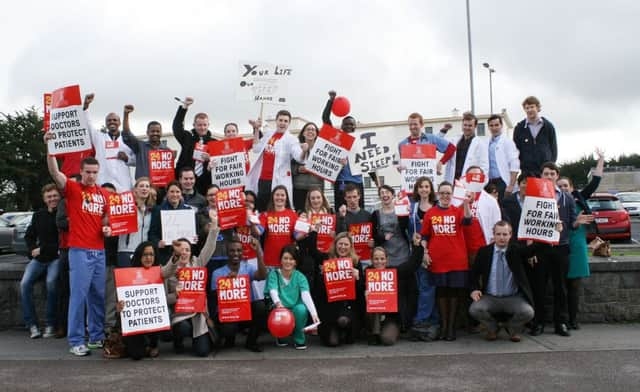Ulster doctor tries to knock sense into striking colleagues


The strike, thankfully, did not extend to Northern Ireland otherwise my appointment would have been cancelled.
On mainland Britain consultants and other senior medics were holding the fort during the strike. Here, in one of our acute hospitals, our junior doctors, young men in green uniforms and women in an assortment of uniforms who look like any of our sons and daughters were still at their posts, walking around in groups, no doubt moving from ward to ward given the time of day. The inevitable stethoscopes hung around their necks or poked precariously out of pockets. The `boss’ was the one not in uniform busy explaining procedures to his students as he walked along with them. Some of these young doctors may already have saved the lives of people we know in between study time and sleep. My experience of them is of polite young people, anxious to get it right making sure you are happy with the way you have been treated before being sent home.
Advertisement
Hide AdAdvertisement
Hide AdMedicine is a complicated, tricky science and only the brightest are selected to study it. We hope they’re dedicated to making us well, we simply can’t imagine they’d be more interested in politics, their pay packets or sit in their student accommodation planning strike action. Yet that’s what has happened on the mainland. All those already well paid clever young men and women, are out on the streets with placards shouting like the kind of loud mouths we once saw on industrial picket lines when Margaret Thatcher was running the country. They demand a change to a proposed seven-day health service – promised to voters in the Tory party’s last manifesto. The junior doctors are clear, unless they’re paid extra and get more time off they’ll have more strikes risking the Health Service itself. Arrogant? Let’s put it this way. It’s not what we expect doctors to do.
The previous day I read one doctor’s account of why he doesn’t support the strike. Adam Dalby who works in Northern Ireland told the Daily Telegraph of how he took the time to read all 80 pages of the first draft contract put before them by the Health Minister. This, he wrote, was a revelation as it gave a 13.5 per cent uprating in basic pay (11 per cent had been the previous offer), an innovative way of monitoring hours under `dedicated guardians’, it limited working hours from 91 to 72 in any week with 15 days study leave. It cut down the number of consecutive nights and long days from the previous contract, and gave a guaranteed, 48-hour break between consecutive long night shifts and night work. He explained how he had ‘gone on a journey’ from centre-right and militant Left and back again.
What influenced him was the inaccurate information from the BMA that their pay was to be cut by 30 per cent and when that inaccuracy had to be ‘parked’ the ‘real BMA propaganda began’ he wrote. He felt the BMA had become ‘too political’ with its emphasis on `protecting the future of the NHS’.
He wrote: ``It seemed an illegitimate campaign for a respectable trade union to be running.’ He suggests his colleagues ought to consider that it is not acceptable for a trade union to campaign in a way that attempts to destabilise a democratically government, which has a mandate to do what it is doing.’’ They most certainly shouldn’t be striking over BMA propaganda, he suggests.
Clearly the dispute is a bitter one but isn’t it encouraging to think that it’s an Ulster based doctor who is trying to knock sense into some of those medical hotheads in England?